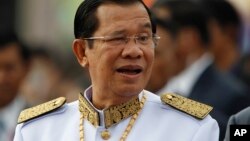Prime Minister Hun Sen on Friday dismissed foreign approval as necessary for next year’s election to be held in accordance with the rule of law and best practices.
The premier made the comments following criticism from several U.S. senators, who last week said they would not recognize the 2018 election if opposition leader Kem Sokha, who was jailed on treason charges in September, was not released.
Hun Sen told a visiting delegation of Southeast Asian and Japanese youth that he was committed to holding the election as scheduled in July next year.
"Whether they [the United States] help or not, it is not important for us. Whether you recognize it [the election] or not, our law demands Cambodian people accept it and that is the end of it,” he said.
He said non-Cambodians should not interfere in Cambodia’s internal affairs and claimed the Cambodian people saw the arrest of Sokha as adhering to Cambodian legal procedure.
On Wednesday, the Supreme Court is due to rule in a case brought by the government against the Cambodia National Rescue Party that could see it dissolved under recent amendments to the political parties law, which has drawn strong criticism from abroad.
Son Chhay, a senior CNRP lawmaker, said foreign parties had to participate in the election in order to observe irregularities and ensure a free and fair election process.
"Today, there are only two parties that people have chosen in the National Assembly and when the CNRP is not allowed to compete, it makes the election not free and fair; it is unconstitutional, and it makes the majority of people unhappy, while the international observers who help to guarantee the implementation of liberal multi-party democracy ... cannot accept it," Chhay said.
Meas Ny, a political analyst, said the election would not be free and fair unless international observers were allowed to participate.
"Elections that comply with the provisions of the constitution and the Paris Accords require international observation and recognition, and when our election is not internationally recognized, the government cannot be recognized."




